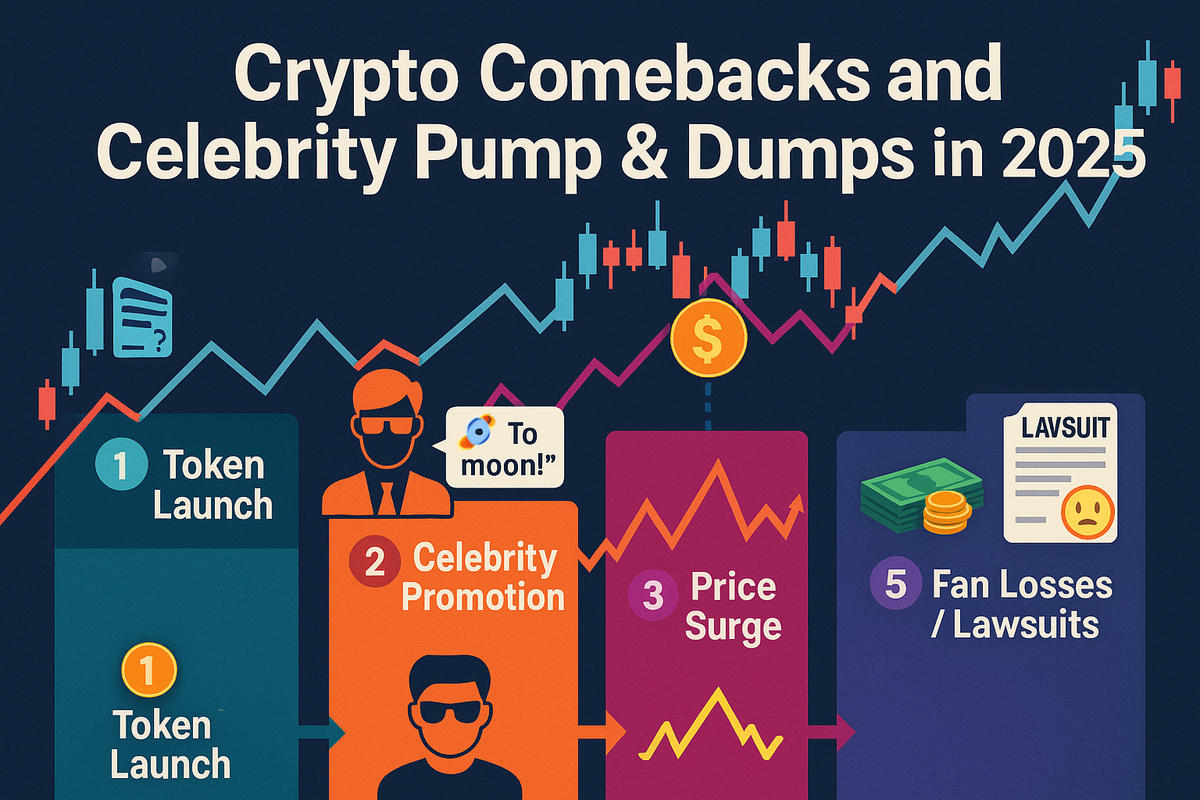Crypto Comebacks and Celebrity Pump & Dumps in 2025
In 2025, celebrities are once again fueling crypto pump-and-dump scams. From wellness tokens to AI-driven coins, fame is weaponized to extract money from fans. Even with SEC crackdowns, celebrity-backed crypto fraud remains a growing threat.

How Fame, Fraud, and the SEC Collide in the Wild West of Digital Hype
Introduction: Crypto Isn't Dead—It's Just Rebranded
Following the brutal bear markets of 2023 and 2022, everybody believed that cryptocurrency had lost its sheen. Memecoins plummeted, NFT projects imploded, and even Bitcoin dabbed at irrelevance. But in 2025, the crypto universe is roaring back and this time, it's not motivated by fintech trailblazers or financial institutions.
It's powered by celebrities. Again.
Welcome to the age of celebrity crypto scams 2.0, where pump and dumps, faked endorsements, and lawsuits are red hot compared to new coins. From former rappers to reality TV rejects, fame is again being translated into bogus financial clout. But now, there is a SEC monitor watching closely, and lawsuits are stacking up on sites such as CourtListener and Justia.
The Return of the Crypto Celebs
Remember the chaos of 2021? Logan Paul, Kim Kardashian, DJ Khaled, Floyd Mayweather, and Soulja Boy were all sued or fined for promoting cryptos that went belly-up. It looked like the industry had learned its lesson.
Wrong.
In 2025, we’re seeing a crypto comeback and the celebs are back in the arena, armed with new marketing angles, stealthier PR firms, and AI-generated hype.
Here is a brief list of celebrities generating crypto news again this year:
- Lil Yachty: Pushing a new "social token" attached to fan engagement.
- Jake Paul: Emerged again with a "regenerative finance" altcoin attached to mental wellness.
- Lana Rhoades: Associated again with flopped NFT project token issuances through influencers.
- A-list Bollywood stars: Stealthily supporting an India-based DeFi project with unconfirmed liquidity pools.
What's new in 2025? The coins are more sophisticated, the promotion more subtle, and the pump-and-dump schemes more covert.
How Celebrity Pump & Dumps Work : 2025 Edition
Pump and dumps are prohibited in conventional security markets but in crypto, there has been a lag in regulation, and so far, influencers have had room to operate. Here's the new playbook:
- Launch a Token: Usually supported by a minimally-functional app or vague promise (e.g., "wellness," "AI," or "social good").
- Get Celebs Onboard: Celebrities don’t always invest—many just get paid in tokens to hype.
- Use Social Algorithms: Leveraging TikTok, Twitter/X, and even AI avatar livestreams to push FOMO.
- Sell at the Top: Once fans invest and prices surge, insiders sell their bags.
- Disappear: Token crashes, website goes dead, Discord locks. Rinse. Repeat.
Sound familiar? That’s because we’ve seen it before—except this time, there’s more legal firepower.
The SEC Is Not Amused
The Securities and Exchange Commission (SEC) has finally cranked up the heat in 2025. No longer holding crypto as "too new to regulate," they've started pursuing influencers and celebrities with aggressive subpoenas and civil fraud cases.
Recent pump and dump lawsuits are as follows:
- U.S. SEC v. HypeToken Inc. & John Does 1–10 (2025)
→ Lawsuit downloaded from CourtListener, accusing 3 influencers and 2 unidentified reality stars.
- Class Action: Ramirez v. FanCoin, LLC et al.
→ Fans lost $4.8M after a "fan-engagement" token touted by stars and athletes plummeted in less than 72 hours.
- SEC Statement (March 2025):
"No fame justifies fraud. The public deserves full transparency especially when trust is weaponized to pump financial products."
The trend is the same: stars put their face on nebulous ventures, fans invest, the token collapses, and lawsuits ensue. The question remains how much accountability holds?
Why the Public Keeps Falling for It
Blame the parasocial economy.
In a world where everyone feels they personally know celebrities, indirect endorsement by these same celebrities sounds like a reliable endorsement. Throw in shiny AI-driven whitepapers and a whirlwind of phony Twitter endorsement, and the typical Gen Z or Millennial investor doesn't have a prayer.
And then there's celebrity financial FOMO:
"If Floyd or Kim or that YouTuber made millions, why not me?"
The truer reality is this: Crypto has become a new kind of clout. Not having a bag in 2025 is equivalent to not having a "blue check" in 2021.
The Rebrand: Memecoins to "Purpose Tokens"
Crypto projects in 2025 are now hiding behind:
- Wellness Coins: Tie-in with mental health orgs
- Climate Tokens: Purportedly planting trees with every transaction
- Charity-Based Coins: Where 1% of every transaction is "donated"
- AI-DeFi: Tokens that can't describe their tech but use futuristic-sounding language
But look closer, and a number of them are not transparent, have not been audited, or even have public dev teams. A number of well-known scams are now being exposed on forums and whistleblower websites saved on Archive.org.
Case Study: Jake Paul's "SoulCoin" Scandal
Launched in early 2025, SoulCoin was a "mental health-backed token" which would be used to pay for therapy for supporters.
But:
- 70% of the original liquidity pool was supposedly owned by Jake's marketing team.
- Prices skyrocketed 500% in 2 days after his viral post.
- Then: a crash, a site wipe, and a Discord ban wave.
By Q2 2025, the project was kaput, but screenshots, blockchain data, and legal complaints persist. The SEC opened an investigation, and class action suits are live on Justia.
One plaintiff alleges:
"He preyed on people with mental health issues for money. That's not innovation that's a scam."
The Legal Loopholes Celebs Still Exploit
Despite lawsuits increasing, the majority of celebrities aren't facing criminal charges. Why?
- They're selling "awareness," not ownership.
- They include #NotFinancialAdvice disclaimers.
- Tokens are sold as "utility," not securities.
- They utilize shell LLCs and offshore wallets.
It's a cat-and-mouse game in the virtual world whereby regulators are perpetually 3 months behind the hype. But with rising class actions and Google Trends displaying spikes for "crypto fraud 2025," public awareness is finally catching up.
The Future: Will Crypto Finally Be Clean?
That rests on enforcement and audience skepticism.
If the public ceases to believe in celebrity endorsements and begins to demand transparency (wallet audits, dev identities, actual utility), crypto may come of age.
If not? Be prepared for another wave of celebrity-endorsed rug pulls during Q3 and Q4 of 2025.
Meanwhile, celebrities and influencers will continue doing what they do best: commodifying attention even at the expense of your trust, your dollars, and your well-being.
Last Thought: Celebrity is the New Financial Fist
In 2025, fame is more lucrative than morality. And in the world of crypto, influence translates immediately into capital fast, specious, and not always traceable.
So the next time you notice your favorite rapper, actor, or TikToker pushing a coin "for the culture".
Ask yourself: Who's actually getting richer?
Sources
- CourtListener – SEC v. HypeToken Inc. (2025)
- Justia – Ramirez v. FanCoin, LLC
- Archive.org – Screenshots of SoulCoin website pre-crash
- Google Trends – "crypto scam 2025" spike
- SEC Official Press Release – March 2025
- CoinDesk & Reuters coverage on 2025 celebrity crypto promotions, https://www.reuters.com/
For more legal exposes and truth-behind-glamour stories, subscribe to AllegedlyNewsNetwork.com




